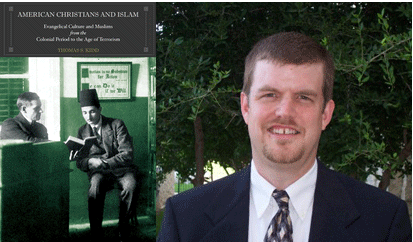
Author Thomas S. Kidd
In the wake of the September 11 terrorist attacks, many of America’s Christian evangelicals have denounced Islam as a “demonic” and inherently violent religion, provoking frustration among other Christian conservatives who wish to present a more appealing message to the world’s Muslims. Yet as Thomas Kidd reveals in this sobering book, the conflicted views expressed by today’s evangelicals have deep roots in American history.
Tracing Islam’s role in the popular imagination of American Christians from the colonial period to today, Kidd demonstrates that Protestant evangelicals have viewed Islam as a global threat–while also actively seeking to convert Muslims to the Christian faith–since the nation’s founding. He shows how accounts of “Mahometan” despotism and lurid stories of European enslavement by Barbary pirates fueled early evangelicals’ fears concerning Islam, and describes the growing conservatism of American missions to Muslim lands up through the post-World War II era. Kidd exposes American Christians’ anxieties about an internal Islamic threat from groups like the Nation of Islam in the 1960s and America’s immigrant Muslim population today, and he demonstrates why Islam has become central to evangelical “end-times” narratives. Pointing to many evangelicals’ unwillingness to acknowledge Islam’s theological commonalities with Christianity and their continued portrayal of Islam as an “evil” and false religion, Kidd explains why Christians themselves are ironically to blame for the failure of evangelism in the Muslim world.
The following is an excerpt from Thomas S. Kidd’s American Christians and Islam: Evangelical Culture and Muslims from the Colonial Period to the Age of Terrorism (Princeton: Princeton University Press, 2008).
This book has offered a host of examples of Christian writers who have eagerly indulged anti-Muslim fantasies, manipulated knowledge of Islam for political purposes, and transformed actual Muslims into puppet-like figures in morose last-days predictions. As far as they have influenced their followers and readers, these Christians have made the continuation of violent conflict that much more likely. They have also made American Christians that much less capable of assessing the political and military wisdom of decisions like whether or not to invade Saddam Hussein’s Iraq. Their work gives a less hopeful aspect to conservative Christians’ role in producing good relations between Christians and Muslims in American civic society, or on the global stage.
I do not believe the Christian impulse toward evangelism of non-Christians, including Muslims, will or should go away. Instead, I would only suggest that Christians take Muslims seriously, minimize or eliminate unnecessarily offensive language, highlight cultural commonalities, and refuse to indulge in sensational stories about the ostensibly evil and demonic character of Islam. They should refuse to baptize any political party or nation as exclusively “Christian,†or to use any party or nation to advance spiritual goals. Ironically, if Christians focused both on maintaining civic peace and testifying to the truth of their religion, they probably would achieve better results in evangelism. Bluster, bombast, and excited forecasts of inexorable destruction do not make for good witnessing, but courtesy and understanding do. The history of American Christian thought about Islam, sadly, has demonstrated precious little courtesy and understanding.
Thomas Kidd is associate professor of History at Baylor University and resident scholar at Baylor’s Institute for Studies of Religion. He is the author of The Great Awakening: The Roots of Evangelical Christianity in Colonial America and The Protestant Interest: New England after Puritanism.